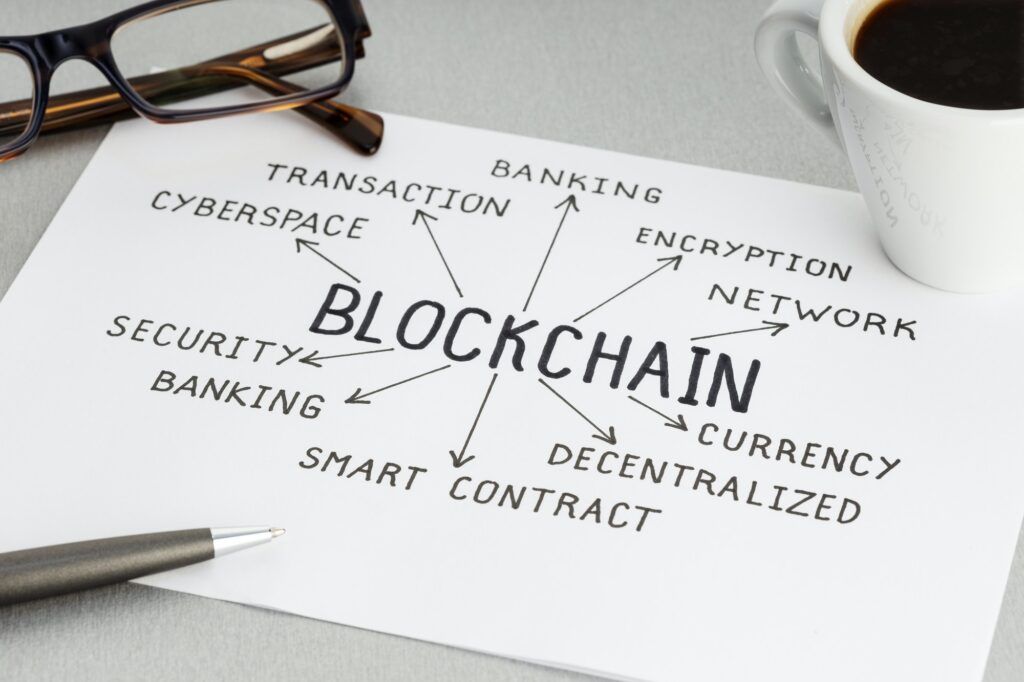How blockchain help decentralize the web ?

What is blockchain?
Many experts believe blockchain technology could lead to greater internet decentralization.
As the internet evolves, a growing number of people are wondering whether it will remain truly decentralized. Right now, a few big corporations and websites exert significant control over key parts of the internet, such as domain naming and data storage. Blockchain technology might help counter this concentration of power, allowing individuals and groups to have more say over their online infrastructure. Supporters also suggest that blockchain might help improve the privacy and safety of the internet, lowering the costs of data storage and DNS services, for instance. However, major challenges lie in wait for anyone who tries to carry out these plans — not least because technical know-how and money will be needed to carry out these proposals.Those who are familiar with blockchain know it as the technology that under girds cryptocurrencies like Bitcoin. The blockchain is a data structure that store information on Many computers at once (in this case, the so-called nodes). The information stored can be about anything: The title to a car, when a contract was signed, or a new block to the chain (That’s why it’s called a blockchain: It’s like a chain of blocks.).
The difference with a traditional database is who can make changes. With a normal database, just one organization or company or person is in charge of making sure the data is correct. If there are any mistakes, it’s tough to find out who made them, since there’s typically only one authority.
But with a blockchain, anyone who has access to the nodes can check if something went wrong. This is because blockchains are “decentralized,” meaning there is no single authority to approve or reject changes. Instead, everyone in the network has a say. If someone wants to make a change to the blockchain, they have to use an encryption key (similar to a password) to update the entire chain — all of the nodes everywhere.
What are the benefits of blockchain?
There are many benefits to blockchain, especially as it relates to cryptocurrencies like Bitcoin. But the touted benefits of the blockchain go far beyond cryptocurrencies. For those who don’t know, the blockchain is the underlying technology behind cryptocurrencies such as Bitcoin.
Blockchain can be described as a bottom up hierarchy data structure in which each “node member” contributes to the integrity of the data stored on the network. This prevents datasets from being controlled by a single entity, ensuring that centralized authority is deterred. Instead, trust is developed through mutual roles and system accountability. Crypto isn’t the only useful thing about blockchain. The same security that makes cryptocurrencies so safe — decentralized control, peer-to-peer transactions, and the lack of a need for a third party like a bank to validate the transaction — could be used to secure information on the internet.
Blockchain could help fight censorship If one person or a group wants to change something on a blockchain that everyone else wants to stay the same, the changes will never align correctly. The changes have to match across every node in the network in order for the blockchain to work. In this way, the blockchain is extremely difficult to hack because of all of these verified steps.
This same concept could be applied to information on the internet. If websites are hosted on a blockchain, third parties won’t be able to restrict or remove certain content, thus helping to fight censorship. Since each block in the chain contains the previous block, removed content would be lost and the deleted blocks wouldn’t align with the remaining blocks on the blockchain.
Blockchains can bypass censorship by keeping websites from having a single IP address. If a website is hosted on a blockchain, all of the information on that site would always be available so long as at least one node holds the necessary key to access the encrypted data. If a single node is taken out of the chain, the chain breaks and all blocks after it are invalidated. This would make it nearly impossible for a single server to be shut down without also shutting down the entire blockchain.
The technology could also help decentralize hosted information and databases so that they aren’t housed in just one place. This could mean that user data and key information isn’t collected and used by third parties like Facebook and Google — things like your search history, messages, facebook page access, and more are currently collected and kept safe by a third party because they can’t be stored securely by any single person. If the internet is decentralized, these third parties won’t be necessary.
Blockchain also has a lot of potential to be used in a fully anonymous and tamper-proof voting system. Right now voting is done online, but these systems can be hacked. Blockchain voting could make the process more secure by ensuring the legitimacy of votes, preventing users from voting twice, and preventing outside interference. The votes would be stored on a public blockchain, making them visible to anyone who wanted to see — but the voters would remain anonymous since their names wouldn’t be linked to their votes.
Blockchain could also make it easier to safely share information between individuals or organizations. A contract could be written into a blockchain, and each party could verify the terms of the contract by checking the blockchain. Similarly, personal data could be collected and shared under the condition that anyone who wants to use that data has to access it through a blockchain and conform to certain rules, meaning that anyone accessing your data would have to do so in a certain way, ensuring your privacy.
Finally, blockchain could help make online payments more secure. Right now when you pay for something online with a credit card there’s a period of time where you don’t know if the transaction went through — often called a payment verification process. Blockchain payment platforms could potentially remove this step since the payment would be verified at the same time it’s made. Blockchain could also be used for digital smart contracts that ensure both parties pay immediately upon the transaction taking place. Once the contract is fulfilled, the money is automatically transferred.
Blockchain may also be used to create a peer-to-peer (P2P) network of websites and pages, meaning that visitors will directly connect to websites instead of passing through an internet service provider or website host that can censor or restrict access to information. Blockchain-only websites wouldn’t need to worry about censorship since they would have a direct connection to guests, and guests wouldn’t need to worry about censorship or restriction of access since they would directly connect to a blockchain-based website.
At least one company, NameBlock has already begun experimenting with a blockchain-only internet. On top of creating a blockchain-based web browser, they’re working on launching a fully blockchain-powered website hosting platform and a completely blockchain-based internet. While it may take several years to implement a completely new and decentralized internet, advances in blockchain could eventually help protect user data and dismantle central points of access and control over the web.
Blockchain cantons: securing the internet instead of decentralizing it?
While a truly decentralized and autonomous internet is an important goal, it may be too lofty to achieve that right away. As an alternative, pieces of the internet could be improved and secured using blockchain technology. Just as countries can be divided into states and provinces, the internet can be divided into ‘netlets’ or bubbles of connected networks.
Blockchain-based protocols could help improve and secure inter-netlet communication, ensuring that central intermediaries don’t have a chance to censor information or collect user data before it passes between network clusters. In fact, blockchains have already been used to create secure inter-netlet communications protocols.
“Right now, a lot of tech companies are trying to decentralize the internet, but that’s a very ambitious goal. Maybe we should start smaller by just trying to secure individual blockchain-based cantons, and then we can expand from there,” Papplebaum said.
It’s an idea that reminds Schilt of novels like Fahrenheit 451 (1953) and The Circle (2012), where governments censor information and control communication.
“We don’t want the internet to turn into a paper book that’s being burnt or a living room where everyone is staring at a screen, ” Schilt said. “We actually want people to interact with each other in person.”
Blockchains have the potential to help decentralize the internet and give users more control over their data. However, there are still some challenges that need to be addressed before blockchain technology can be widely adopted. For example, scalability is a major concern that needs to be resolved. Additionally, the use of blockchains also raises privacy concerns. Nonetheless, blockchain technology is a promising solution for decentralizing the internet and giving users more control over their data.
